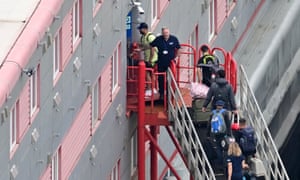The rolling strikes by NHS nurses could “hit the end of the road” this week as the leader of the Royal College of Nursing raised doubts over whether sufficient numbers of members would get their postal votes in on time.
The RCN union’s ballot on further industrial action in England will close on 23 June but its general secretary, Pat Cullen, has for the first time suggested an affirmative result is in doubt.
Nurses have taken strike action three times since December but the RCN needs the support of its members at another ballot if it is continue to leverage further strikes in its pay negotiation.
Under the 2016 trade union laws, at least 50% of union members must vote in a ballot for its result to stand – equivalent to more than 150,000 of the RCN’s membership.
Speaking to the Guardian during a visit to a hospital in Guildford, Surrey, Cullen said the union laws and the lack of online voting option could bring the nurses’ strikes over pay and conditions to an end.
She added: “Talking to nurses today, it is clear that they are unhappy with how they’re being treated and feel the NHS is on a precipice. After nurses said they needed better from government, they can vote again on whether to take more strike action until December. There are only a couple of days left to vote by post and it is starting to look like the government’s rules on postal voting could get the better of us.”
Cullen, who is seeking a double-digit pay rise for nurses, said she believed the vote would indicate support for further strikes but the 50% voting threshold may not be reached.
She said: “Nursing staff can still post their ballots back but unless 150,000 people get their votes sent back in the post then the strike has hit the end of the road. Secure online voting was used to select a new Conservative prime minister last year so it is clear they just want to make it harder for working people to have their voices heard.
“For the rest of the week we’ll be visiting hospitals and reminding people that if they want to keep the pressure on the government they have to think of the postbox like a ballot box.”
The first national strike in the history of the RCN took place in December, with the union arguing that the pay of some experienced nurses had fallen by 20% in real terms since the Conservative party came to power. The RCN had originally called for a 19% pay rise.
after newsletter promotion
Further strikes took place in January and February, and then again in April after the RCN membership rejected an improved offer of a 5% pay rise for 2023-24 and a one-off payment of at least £1,655. This was on top of the average 4.75% pay rise NHS staff had received in 2022-23.
The offer was accepted by Unison, the GMB and Royal College of Midwives and others, leading the NHS staff council to accept it. The RCN and Unite, however, remain in dispute.
In the latest RCN ballot the union is seeking a countrywide mandate, rather than at individual trust level. A vote in support would give the RCN a mandate to strike in every NHS trust or other NHS employer in England where members work.
The next strikes would involve twice the number of nursing staff at twice as many locations. The results of the ballot are expected to be announced next week.
Join the exciting world of cryptocurrency trading with ByBit! As a new trader, you can benefit from a $10 bonus and up to $1,000 in rewards when you register using our referral link. With ByBit’s user-friendly platform and advanced trading tools, you can take advantage of cryptocurrency volatility and potentially make significant profits. Don’t miss this opportunity – sign up now and start trading!







Recent Comments